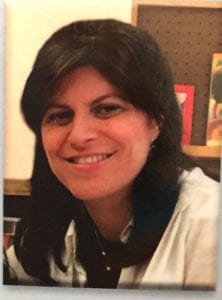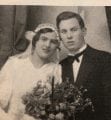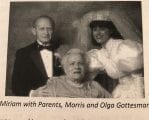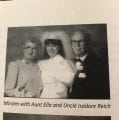- Voices of Descendants
- MIRIAM F. DOBIN
- Voices of Descendants
- MIRIAM F. DOBIN
Descendant Profile

MIRIAM
F.
DOBIN
(SECOND GENERATION)
DESCENDANT:
MIRIAM F. DOBIN
MIRIAM F. DOBIN
RELATED SURVIVOR(S):
-
DESCENDANT BRIEF BIOGRAPHY BY miriam dobin, author of I am because of you
My name is Miriam Dobin. I am a Hebrew school Program Director and have been an Early Childhood Educator with over twenty-five years of experience. My husband and I raised three children and we are the proud grandparents of three delicious little girls. However, that’s just on the surface. My real story began 75 years ago.
I didn’t come into this world easily. In fact, I never should have been born at all.
When my mother was in her twenties, during World War II, she was a prisoner, her health irreparably ruined in the Auschwitz concentration camp. She was starved and weakened, and her menses ceased, never to return. Though my mother survived the Holocaust, came to America, married, and began to make a new life, she never dreamed that she could have a child. But then, in 1964, ten weeks shy of her forty-eighth birthday, my mother gave birth to me, her miracle baby, her only child.
My memoir, I Am Because of You, is a tale of survival and faith despite terrible odds. My family’s journey from near extinction to thriving new generations, from faith to anger and back again, is about ordinary people with the courage to overcome incredible challenges that would permanently derail others. It is about seeing sparks of light in the darkness, about recognizing miracles in this world.
Editor’s Notes:
Refer to Descendant Submission Below for Eulogy to Morris Gottesman.
Refer to Miriam Dobin’s memoir, I Am Because of You or website at www.Iambecauseofyou.net
-
DESCENDANT SUBMISSION(s):
-
Sources and Credits:
SSBJCC Holocaust Memorial and Education Center gratefully acknowledges the donation of Miriam Dobin’s memoir, I Am Because of You along with extensive digital historic and family photographs and documents therein.
Credits:
The Holocaust Memorial and Education Center gratefully acknowledges permission to publish eulogy to Morris Gottesman and donation of the memoir, I Am Because of You by Miriam Dobin. I Am Because of You is available at Amazon.









